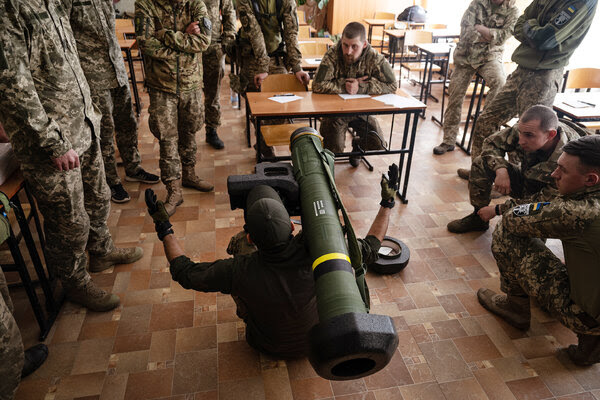I became your enemy because I tell you the truth
“You can fool some of the people all the time and all the people some of the time,
but you can’t fool all the people all the time.” A. Lincoln
Russia turned Bakhmut into the graveyard of Ukrainian military power, Col. Douglas MacGregor (ret.) explains ‘what comes next’ in his latest opinion piece at The American Conservative:
Until the fighting begins, national military strategy developed in peacetime shapes thinking about warfare and its objectives. Then the fighting creates a new logic of its own. Strategy is adjusted. Objectives change. The battle for Bakhmut illustrates this point very well.
When General Sergey Vladimirovich Surovikin, commander of Russian aerospace forces, assumed command of the Russian military in the Ukrainian theater last year, President Vladimir Putin and his senior military advisors concluded that their original assumptions about the war were wrong. Washington had proved incurably hostile to Moscow’s offers to negotiate, and the ground force Moscow had committed to compel Kiev to negotiate had proved too small.
Surovikin was given wide latitude to streamline command relationships and reorganize the theater. Most importantly, Surovikin was also given the freedom of action to implement a defensive strategy that maximized the use of stand-off attack or strike systems while Russian ground forces expanded in size and striking power. The Bakhmut “Meatgrinder” was the result.
When it became clear that Ukraine’s President Volodymyr Zelensky and his government regarded Bakhmut as a symbol of Ukrainian resistance to Russian military power, Surovikin turned Bakhmut into the graveyard of Ukrainian military power. From the fall of 2022 onward, Surovikin exploited Zalenskiy’s obsession with Bakhmut to engage in a bloody tug-of-war for control of the city. As a result, thousands of Ukrainian soldiers died in Bakhmut and many more were wounded.
Surovkin’s performance is reminiscent of another Russian military officer: General Aleksei Antonov. As the first deputy chief of the Soviet general staff, Surovikin was, in Western parlance, the director of strategic planning. When Stalin demanded a new summer offensive in a May 1943 meeting, Antonov, the son and grandson of imperial Russian army officers, argued for a defensive strategy. Antonov insisted that Hitler, if allowed, would inevitably attack the Soviet defenses in the Kursk salient and waste German resources doing so.
Stalin, like Hitler, believed that wars were won with offensive action, not defensive operations.
Stalin was unmoved by Soviet losses. Antonov presented his arguments for the defensive strategy in a climate of fear, knowing that contradicting Stalin could cost him his life. To the surprise of Marshals Aleksandr Vasilevsky and Georgy Zhukov, who were present at the meeting, Stalin relented and approved Antonov’s operational concept. The rest, as historians say, is history.
If President Putin and his senior military leaders wanted outside evidence for Surovikin’s strategic success in Bakhmut, a Western admission appears to provide it: Washington and her European allies seem to think that a frozen conflict—in which fighting pauses but neither side is victorious, nor does either side agree that the war is officially over—could be the most politically palatable long-term outcome for NATO. In other words, Zelensky’s supporters no longer believe in the myth of Ukrainian victory.
The question on everyone’s mind is, what’s next?
In Washington, conventional wisdom dictates that Ukrainian forces launch a counteroffensive to retake Southern Ukraine. Of course, conventional wisdom is frequently high on convention and low on wisdom. On the assumption that Ukraine’s black earth will dry sufficiently to support ground maneuver forces before mid-June, Ukrainian forces will strike Russian defenses on multiple axes and win back control of Southern Ukraine in late May or June. Roughly 30,000 Ukrainian soldiers training in Great Britain, Germany, and other NATO member states are expected to return to Ukraine and provide the foundation for the Ukrainian counterattack force.
General Valery Gerasimov, who now commands the Russian forces in the Ukrainian theater, knows what to expect, and he is undoubtedly preparing for the Ukrainian offensive. The partial mobilization of Russian forces means that Russian ground forces are now much larger than they have been since the mid-1980s.
Given the paucity of ammunition available to adequately supply one operational axis, it seems unlikely that a Ukrainian offensive involving two or more axes could succeed in penetrating Russian defenses. Persistent overhead surveillance makes it nearly impossible for Ukrainian forces to move through the twenty- to twenty-five-kilometer security zone and close with Russian forces before Ukrainian formations take significant losses.
Once Ukraine’s offensive resources are exhausted Russia will likely take the offense. There is no incentive to delay Russian offensive operations. As Ukrainian forces repeatedly demonstrate, paralysis is always temporary. Infrastructure and equipment are repaired. Manpower is conscripted to rebuild destroyed formations. If Russia is to achieve its aim of demilitarizing Ukraine, Gerasimov surely knows he must still close with and complete the destruction of the Ukrainian ground forces that remain.
Why not spare the people of Ukraine further bloodletting and negotiate with Moscow for peace while Ukraine still possesses an army? Unfortunately, to be effective, diplomacy requires mutual respect, and Washington’s effusive hatred for Russia makes diplomacy impossible. That hatred is rivaled only by the arrogance of much of the ruling class, who denigrate Russian military power largely because U.S. forces have been lucky enough to avoid conflict with a major power since the Korean War. More sober-minded leaders in Washington, Paris, Berlin, and other NATO capitols should urge a different course of action.
* * *
Finally, we note that Col. MacGregor sat down with host Charlie Kirk about the grave situation in Ukraine today, as well as an in-depth discussion of current geopolitical picture relating the US and NATO.
“…the truth is Bakhmut was a catastrophe and everyone knows it… people know the Ukrainians can’t win and now we’re acting desperately at every turn – send them F-16s, send them whatever we have; Truth is none of that is going to make any difference… the real risk now is that fools in Washington will talk about direct intervention…”
Click the image below to go to YouTube directly (video not embeddable) for this critically frank interview:
All it takes for Evil to triumph is for good people to do nothing
https://www.zerohedge.com/geopolitical/col-douglas-macgregor-bakhmut-catastrophe-ukraine-f-16s-wont-make-difference?utm_source=substack&utm_medium=email
Michael Loyman


